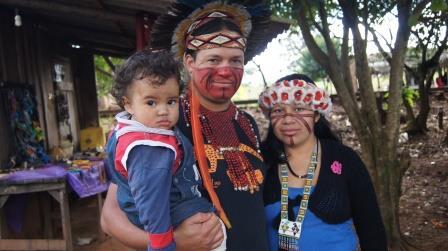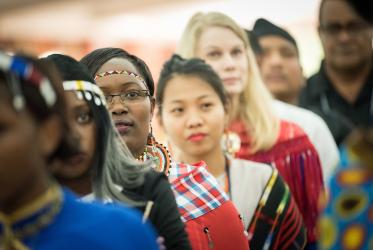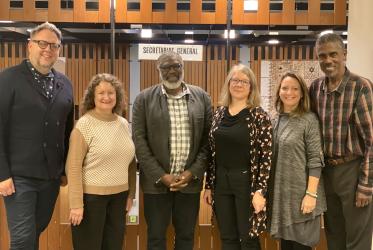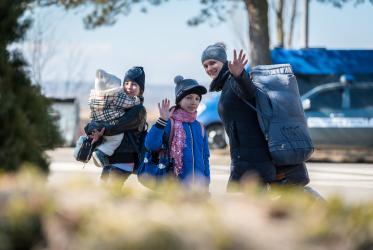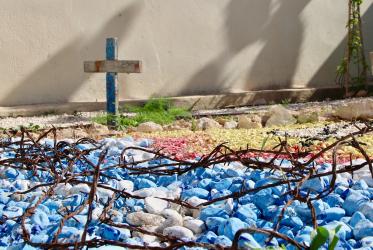Strengthening their common indigenous identity and involvement in church life, young leaders from the Sami community of the Church of Sweden, a member church of the World Council of Churches (WCC), met recently with indigenous counterparts in Brazil.
The Sami are an indigenous people of the Arctic region, and they called their visit inspiring and empowering.
The Sami group that visited Rio Grande do Sul in May included Moa Lango from Ammarnäs and Katarina Poggats-Sarri from Nikkaluokta.
Presentations on the culture and pride of Brazilian people from Guarani, Xokleng-Laklãnõ and Kaingang communities, and Ecuador's Otavalo peoples, were termed moving and enlightening by the Sami leaders.
While in Rio Grande do Sul, the group participated in a course on “gender relations in indigenous contexts” organized by the COMIN – a body for mission among indigenous peoples, coordinated by the Evangelical Church of the Lutheran Confession in Brazil.
The Sami leaders met two communities from Guaraní peoples. “They were really lovely people, harmonious and spiritual, and they were very inspiring,” said Moa Lango.
“Many of them have been stripped of their land and other rights; they are fighting in land disputes while their leaders are being murdered,” said Lango, who is a student of history and religion at the Umeå University and works with Ammarnäs parish as a confirmation leader.
“One of the communities we met told us how they are desperate to farm the land but do not dare as land disputes are an issue for the Brazilian court,” added Lango.
The young Samis also identified links between cultures. “We have similar views on life; we had many commonalities, such as respect for nature! We face the same struggles over land – although their fight is bloodier,” noted Poggats-Sarri.
Sermon on the Mount from a Sami perspective
Sami delegate Poggats-Sarri felt inspired by a Bible reading from the perspective of indigenous peoples, held by the Center for Bible Studies (CEBI) in Brazil, which pioneered contextual Bible study in base Christian communities.
“The reading was about the Sermon on the Mount (Matthew 5-7). Reading and discussing Bible from a Sami perspective gives a new angle that I think would appeal to young Sami people. It’s perhaps something that could be part of confirmation classes, if it isn’t already,” she said.
“This is a way for the church to work with issues related to indigenous peoples, for example, to reach out to young people and build relationships. I hope the Church of Sweden is keen to protect its indigenous peoples and is serious in addressing their issues,” said Lango.
“I hope the church takes the outcome of this exchange on board and sends more young people, and maybe not just to Brazil. I’ve no doubt it would be an effective way of strengthening the identity of young Sami people,” said Poggats-Sarri, who documented the visit on film. A student of filmmaking at Fridhem Folk High School in Skane, Poggats-Sarri is vice-chair of the Sami Council in the Church of Sweden.
“There is a need for employees and committed Sami representatives in the parishes. The Sami confirmation church camp is well attended and popular. There is a resource of young leaders that needs to be mobilized to breathe life into Sami church life,” she said.
Significant encounters
Rev. Renate Gierus, coordinator of COMIN, called the visit extremely important. “Cultural encounters open new perspectives to indigenous communities, strengthen dialogue and partnership, common causes and identities,” she said.
“This encounter, meant to overcome common challenges, is therapeutic. It brings healing, renews hopes, unites and encourages all to keep walking forward,” added Gierus.
One of the goals of COMIN is to promote spaces where such dialogues can happen. “One of the main lines of work for us is inter-religious and intercultural dialogue. Both visits were inspired by this perspective,” she said.
“By welcoming the young Samis to Brazil, we want to be a channel of communication to build and strengthen a world that is more plural,” concluded Gierus.
COMIN is supported by the Norwegian Church Aid, the Evangelical Lutheran Church in Bayern, the Lutheran World Federation, Bread for the World, Kerk in Actie, Kindernothilfe and Evangelisch-Lutherisches Missionswerk.
The Central Church Office of the Church of Sweden plans to send young Sami leaders more often to Brazil, as well as to receive visitors from Brazil’s young indigenous population.
The Church of Sweden hosted a similar visit from Brazilian indigenous peoples’ representatives in March 2014. The delegation was formed by two young adults from the Tupinikim and the Pataxó HãHãHãe communities. The 2015 visit was a reciprocal visit from Sweden planned with intention to enhance dialogue and advocacy work.
The Church of Sweden received positive feedback from the participants involved in organizing the visit and meetings in Brazil.
WCC news article based on report from Roland Asplund.
Reclaiming our humanity (WCC feature article of 23 June 2015)
